Marketing Business Report: Booking.com UK Operations
VerifiedAdded on 2023/01/03
|9
|3089
|99
Report
AI Summary
This report provides a comprehensive analysis of Booking.com's marketing strategies within the UK market. It begins with an introduction to Booking.com and its recent performance, followed by an examination of the micro and macro factors impacting its business, with a specific focus on the PESTLE framework. The report identifies and analyzes the main target audiences, including domestic UK travelers, youth, and business travelers, highlighting the importance of market segmentation. Brand positioning is discussed using a perceptual map to compare Booking.com with its competitors. A detailed marketing strategy is developed, encompassing buyer behavior analysis, market-targeting strategies (mass, differentiated, and concentrated), and an evaluation of the marketing mix. The report concludes with a discussion of future prospects, considering the evolving travel industry trends, such as safety and sustainability, and provides recommendations for improving sales and market share. This includes promoting hygienic accommodations, psychological pricing, and enhanced promotional tools like social media and influencer marketing.
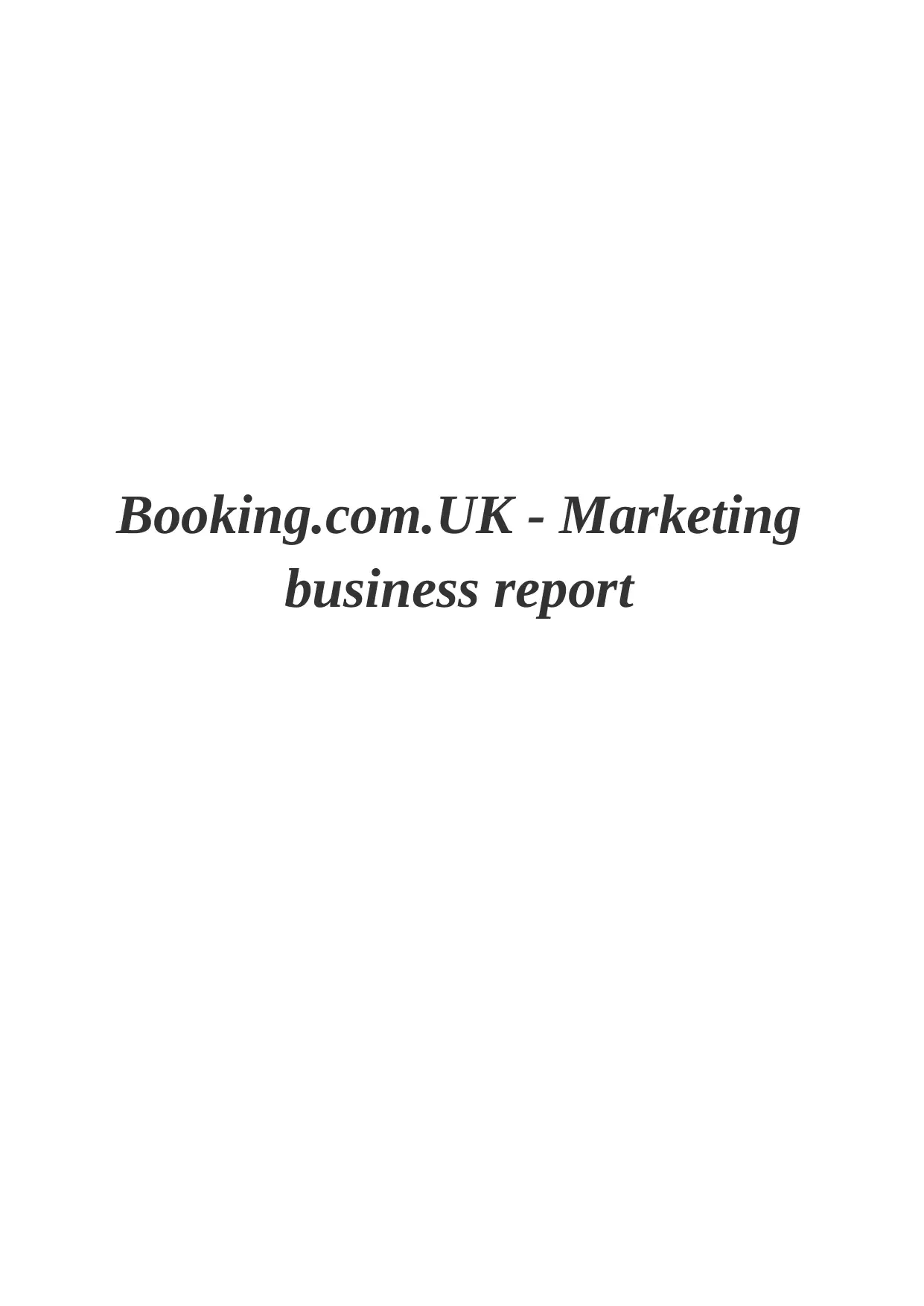
Booking.com.UK - Marketing
business report
business report
Paraphrase This Document
Need a fresh take? Get an instant paraphrase of this document with our AI Paraphraser
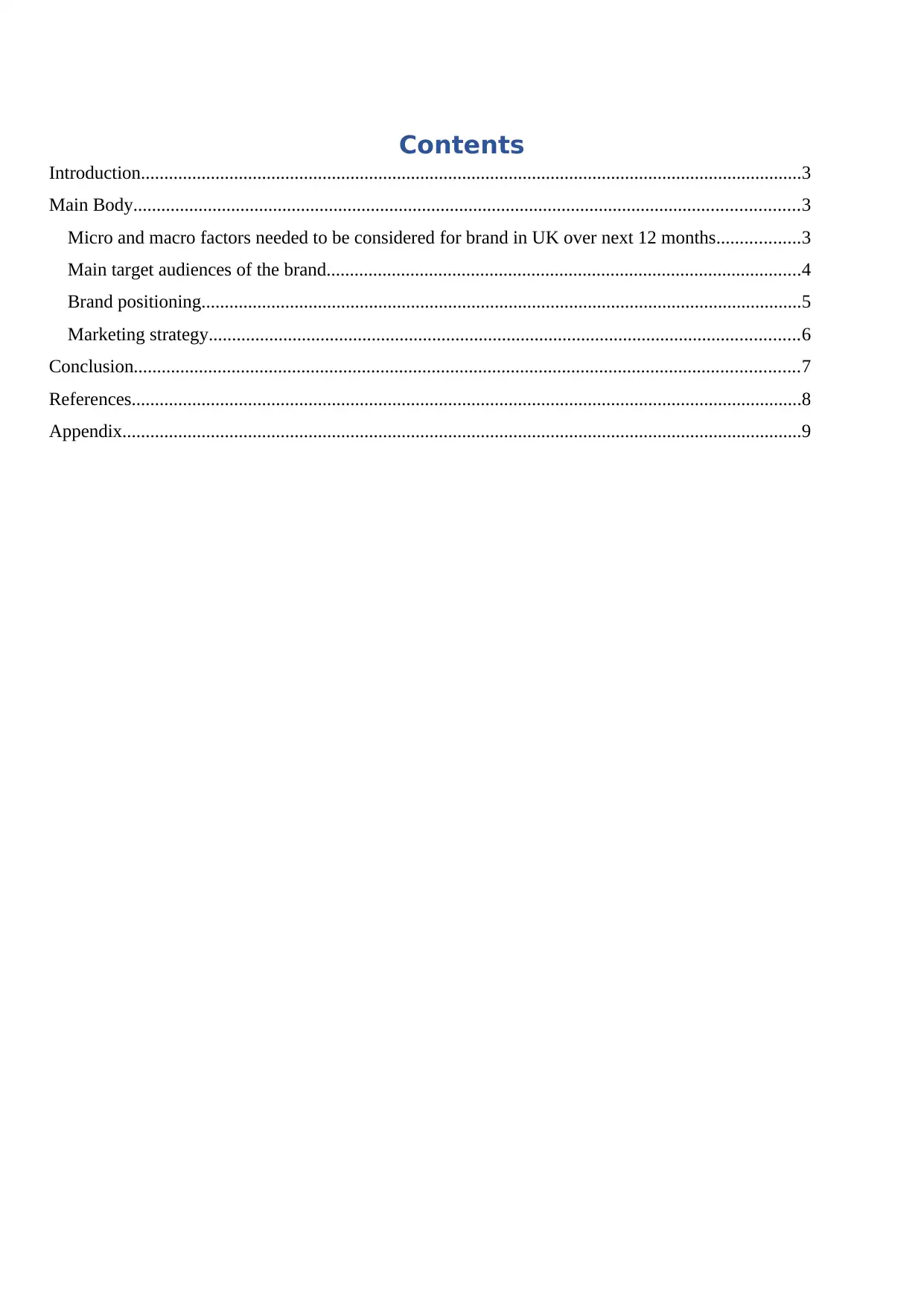
Contents
Introduction..............................................................................................................................................3
Main Body...............................................................................................................................................3
Micro and macro factors needed to be considered for brand in UK over next 12 months..................3
Main target audiences of the brand......................................................................................................4
Brand positioning.................................................................................................................................5
Marketing strategy...............................................................................................................................6
Conclusion...............................................................................................................................................7
References................................................................................................................................................8
Appendix..................................................................................................................................................9
Introduction..............................................................................................................................................3
Main Body...............................................................................................................................................3
Micro and macro factors needed to be considered for brand in UK over next 12 months..................3
Main target audiences of the brand......................................................................................................4
Brand positioning.................................................................................................................................5
Marketing strategy...............................................................................................................................6
Conclusion...............................................................................................................................................7
References................................................................................................................................................8
Appendix..................................................................................................................................................9
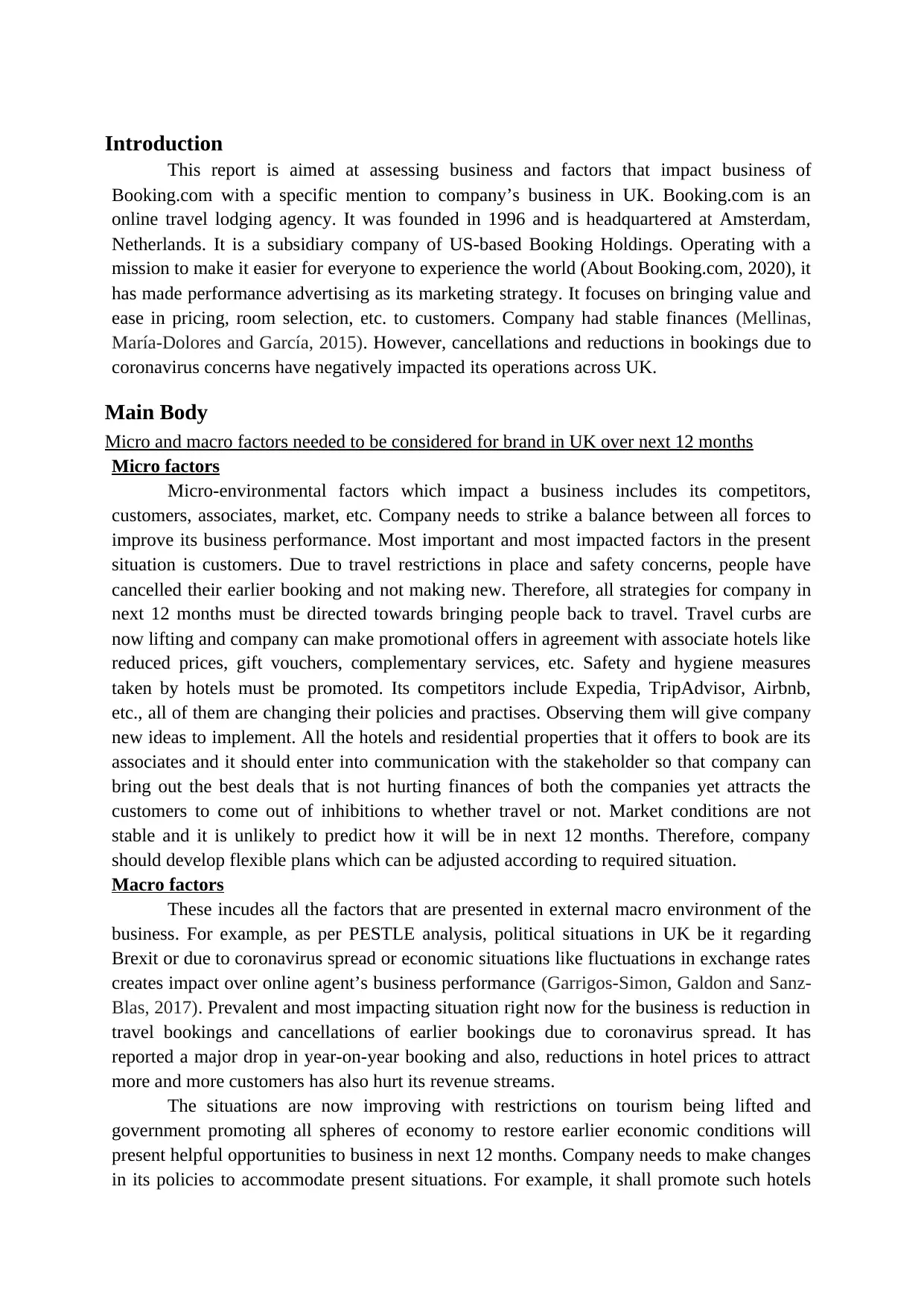
Introduction
This report is aimed at assessing business and factors that impact business of
Booking.com with a specific mention to company’s business in UK. Booking.com is an
online travel lodging agency. It was founded in 1996 and is headquartered at Amsterdam,
Netherlands. It is a subsidiary company of US-based Booking Holdings. Operating with a
mission to make it easier for everyone to experience the world (About Booking.com, 2020), it
has made performance advertising as its marketing strategy. It focuses on bringing value and
ease in pricing, room selection, etc. to customers. Company had stable finances (Mellinas,
María-Dolores and García, 2015). However, cancellations and reductions in bookings due to
coronavirus concerns have negatively impacted its operations across UK.
Main Body
Micro and macro factors needed to be considered for brand in UK over next 12 months
Micro factors
Micro-environmental factors which impact a business includes its competitors,
customers, associates, market, etc. Company needs to strike a balance between all forces to
improve its business performance. Most important and most impacted factors in the present
situation is customers. Due to travel restrictions in place and safety concerns, people have
cancelled their earlier booking and not making new. Therefore, all strategies for company in
next 12 months must be directed towards bringing people back to travel. Travel curbs are
now lifting and company can make promotional offers in agreement with associate hotels like
reduced prices, gift vouchers, complementary services, etc. Safety and hygiene measures
taken by hotels must be promoted. Its competitors include Expedia, TripAdvisor, Airbnb,
etc., all of them are changing their policies and practises. Observing them will give company
new ideas to implement. All the hotels and residential properties that it offers to book are its
associates and it should enter into communication with the stakeholder so that company can
bring out the best deals that is not hurting finances of both the companies yet attracts the
customers to come out of inhibitions to whether travel or not. Market conditions are not
stable and it is unlikely to predict how it will be in next 12 months. Therefore, company
should develop flexible plans which can be adjusted according to required situation.
Macro factors
These incudes all the factors that are presented in external macro environment of the
business. For example, as per PESTLE analysis, political situations in UK be it regarding
Brexit or due to coronavirus spread or economic situations like fluctuations in exchange rates
creates impact over online agent’s business performance (Garrigos-Simon, Galdon and Sanz-
Blas, 2017). Prevalent and most impacting situation right now for the business is reduction in
travel bookings and cancellations of earlier bookings due to coronavirus spread. It has
reported a major drop in year-on-year booking and also, reductions in hotel prices to attract
more and more customers has also hurt its revenue streams.
The situations are now improving with restrictions on tourism being lifted and
government promoting all spheres of economy to restore earlier economic conditions will
present helpful opportunities to business in next 12 months. Company needs to make changes
in its policies to accommodate present situations. For example, it shall promote such hotels
This report is aimed at assessing business and factors that impact business of
Booking.com with a specific mention to company’s business in UK. Booking.com is an
online travel lodging agency. It was founded in 1996 and is headquartered at Amsterdam,
Netherlands. It is a subsidiary company of US-based Booking Holdings. Operating with a
mission to make it easier for everyone to experience the world (About Booking.com, 2020), it
has made performance advertising as its marketing strategy. It focuses on bringing value and
ease in pricing, room selection, etc. to customers. Company had stable finances (Mellinas,
María-Dolores and García, 2015). However, cancellations and reductions in bookings due to
coronavirus concerns have negatively impacted its operations across UK.
Main Body
Micro and macro factors needed to be considered for brand in UK over next 12 months
Micro factors
Micro-environmental factors which impact a business includes its competitors,
customers, associates, market, etc. Company needs to strike a balance between all forces to
improve its business performance. Most important and most impacted factors in the present
situation is customers. Due to travel restrictions in place and safety concerns, people have
cancelled their earlier booking and not making new. Therefore, all strategies for company in
next 12 months must be directed towards bringing people back to travel. Travel curbs are
now lifting and company can make promotional offers in agreement with associate hotels like
reduced prices, gift vouchers, complementary services, etc. Safety and hygiene measures
taken by hotels must be promoted. Its competitors include Expedia, TripAdvisor, Airbnb,
etc., all of them are changing their policies and practises. Observing them will give company
new ideas to implement. All the hotels and residential properties that it offers to book are its
associates and it should enter into communication with the stakeholder so that company can
bring out the best deals that is not hurting finances of both the companies yet attracts the
customers to come out of inhibitions to whether travel or not. Market conditions are not
stable and it is unlikely to predict how it will be in next 12 months. Therefore, company
should develop flexible plans which can be adjusted according to required situation.
Macro factors
These incudes all the factors that are presented in external macro environment of the
business. For example, as per PESTLE analysis, political situations in UK be it regarding
Brexit or due to coronavirus spread or economic situations like fluctuations in exchange rates
creates impact over online agent’s business performance (Garrigos-Simon, Galdon and Sanz-
Blas, 2017). Prevalent and most impacting situation right now for the business is reduction in
travel bookings and cancellations of earlier bookings due to coronavirus spread. It has
reported a major drop in year-on-year booking and also, reductions in hotel prices to attract
more and more customers has also hurt its revenue streams.
The situations are now improving with restrictions on tourism being lifted and
government promoting all spheres of economy to restore earlier economic conditions will
present helpful opportunities to business in next 12 months. Company needs to make changes
in its policies to accommodate present situations. For example, it shall promote such hotels
⊘ This is a preview!⊘
Do you want full access?
Subscribe today to unlock all pages.

Trusted by 1+ million students worldwide
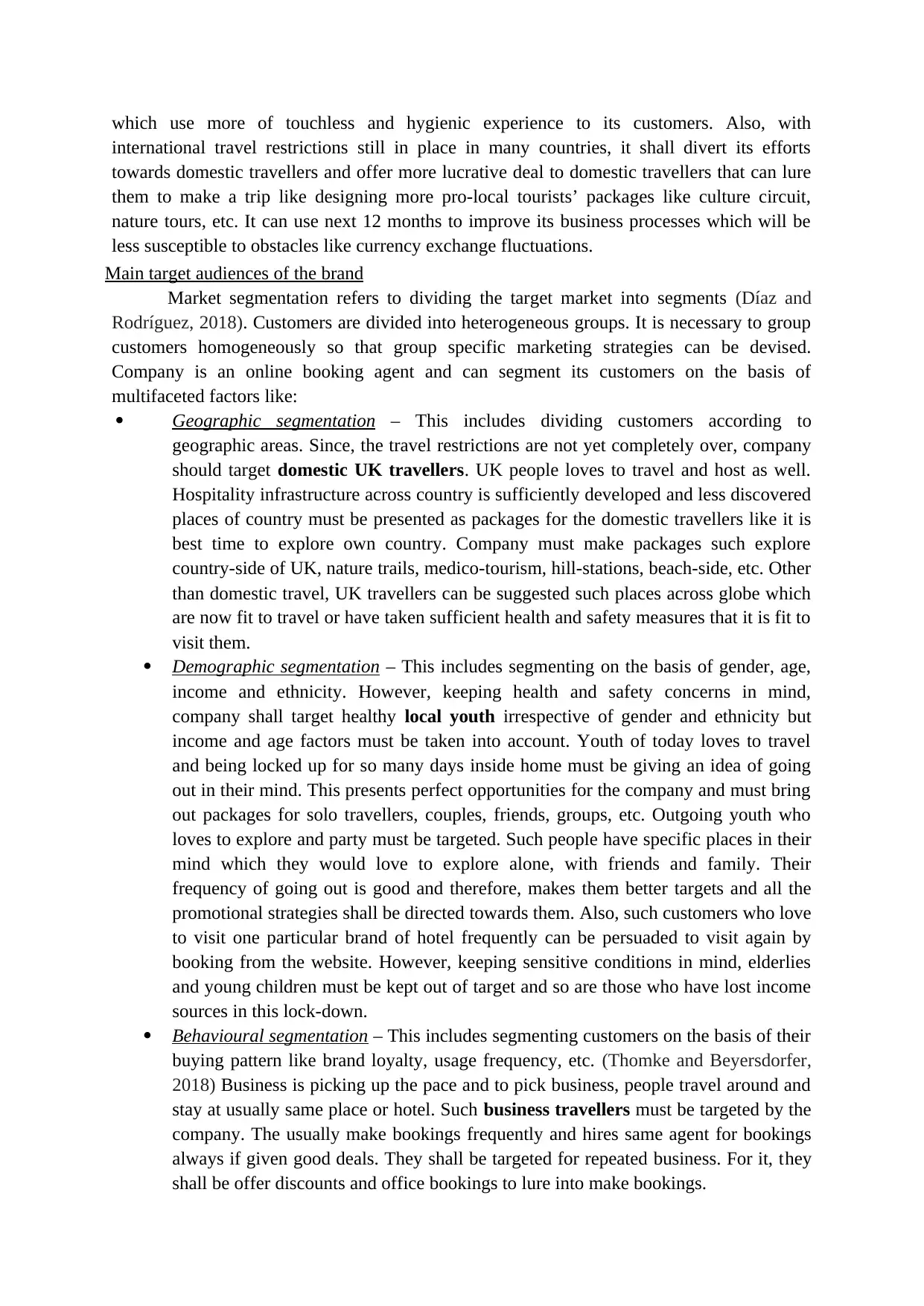
which use more of touchless and hygienic experience to its customers. Also, with
international travel restrictions still in place in many countries, it shall divert its efforts
towards domestic travellers and offer more lucrative deal to domestic travellers that can lure
them to make a trip like designing more pro-local tourists’ packages like culture circuit,
nature tours, etc. It can use next 12 months to improve its business processes which will be
less susceptible to obstacles like currency exchange fluctuations.
Main target audiences of the brand
Market segmentation refers to dividing the target market into segments (Díaz and
Rodríguez, 2018). Customers are divided into heterogeneous groups. It is necessary to group
customers homogeneously so that group specific marketing strategies can be devised.
Company is an online booking agent and can segment its customers on the basis of
multifaceted factors like:
Geographic segmentation – This includes dividing customers according to
geographic areas. Since, the travel restrictions are not yet completely over, company
should target domestic UK travellers. UK people loves to travel and host as well.
Hospitality infrastructure across country is sufficiently developed and less discovered
places of country must be presented as packages for the domestic travellers like it is
best time to explore own country. Company must make packages such explore
country-side of UK, nature trails, medico-tourism, hill-stations, beach-side, etc. Other
than domestic travel, UK travellers can be suggested such places across globe which
are now fit to travel or have taken sufficient health and safety measures that it is fit to
visit them.
Demographic segmentation – This includes segmenting on the basis of gender, age,
income and ethnicity. However, keeping health and safety concerns in mind,
company shall target healthy local youth irrespective of gender and ethnicity but
income and age factors must be taken into account. Youth of today loves to travel
and being locked up for so many days inside home must be giving an idea of going
out in their mind. This presents perfect opportunities for the company and must bring
out packages for solo travellers, couples, friends, groups, etc. Outgoing youth who
loves to explore and party must be targeted. Such people have specific places in their
mind which they would love to explore alone, with friends and family. Their
frequency of going out is good and therefore, makes them better targets and all the
promotional strategies shall be directed towards them. Also, such customers who love
to visit one particular brand of hotel frequently can be persuaded to visit again by
booking from the website. However, keeping sensitive conditions in mind, elderlies
and young children must be kept out of target and so are those who have lost income
sources in this lock-down.
Behavioural segmentation – This includes segmenting customers on the basis of their
buying pattern like brand loyalty, usage frequency, etc. (Thomke and Beyersdorfer,
2018) Business is picking up the pace and to pick business, people travel around and
stay at usually same place or hotel. Such business travellers must be targeted by the
company. The usually make bookings frequently and hires same agent for bookings
always if given good deals. They shall be targeted for repeated business. For it, they
shall be offer discounts and office bookings to lure into make bookings.
international travel restrictions still in place in many countries, it shall divert its efforts
towards domestic travellers and offer more lucrative deal to domestic travellers that can lure
them to make a trip like designing more pro-local tourists’ packages like culture circuit,
nature tours, etc. It can use next 12 months to improve its business processes which will be
less susceptible to obstacles like currency exchange fluctuations.
Main target audiences of the brand
Market segmentation refers to dividing the target market into segments (Díaz and
Rodríguez, 2018). Customers are divided into heterogeneous groups. It is necessary to group
customers homogeneously so that group specific marketing strategies can be devised.
Company is an online booking agent and can segment its customers on the basis of
multifaceted factors like:
Geographic segmentation – This includes dividing customers according to
geographic areas. Since, the travel restrictions are not yet completely over, company
should target domestic UK travellers. UK people loves to travel and host as well.
Hospitality infrastructure across country is sufficiently developed and less discovered
places of country must be presented as packages for the domestic travellers like it is
best time to explore own country. Company must make packages such explore
country-side of UK, nature trails, medico-tourism, hill-stations, beach-side, etc. Other
than domestic travel, UK travellers can be suggested such places across globe which
are now fit to travel or have taken sufficient health and safety measures that it is fit to
visit them.
Demographic segmentation – This includes segmenting on the basis of gender, age,
income and ethnicity. However, keeping health and safety concerns in mind,
company shall target healthy local youth irrespective of gender and ethnicity but
income and age factors must be taken into account. Youth of today loves to travel
and being locked up for so many days inside home must be giving an idea of going
out in their mind. This presents perfect opportunities for the company and must bring
out packages for solo travellers, couples, friends, groups, etc. Outgoing youth who
loves to explore and party must be targeted. Such people have specific places in their
mind which they would love to explore alone, with friends and family. Their
frequency of going out is good and therefore, makes them better targets and all the
promotional strategies shall be directed towards them. Also, such customers who love
to visit one particular brand of hotel frequently can be persuaded to visit again by
booking from the website. However, keeping sensitive conditions in mind, elderlies
and young children must be kept out of target and so are those who have lost income
sources in this lock-down.
Behavioural segmentation – This includes segmenting customers on the basis of their
buying pattern like brand loyalty, usage frequency, etc. (Thomke and Beyersdorfer,
2018) Business is picking up the pace and to pick business, people travel around and
stay at usually same place or hotel. Such business travellers must be targeted by the
company. The usually make bookings frequently and hires same agent for bookings
always if given good deals. They shall be targeted for repeated business. For it, they
shall be offer discounts and office bookings to lure into make bookings.
Paraphrase This Document
Need a fresh take? Get an instant paraphrase of this document with our AI Paraphraser
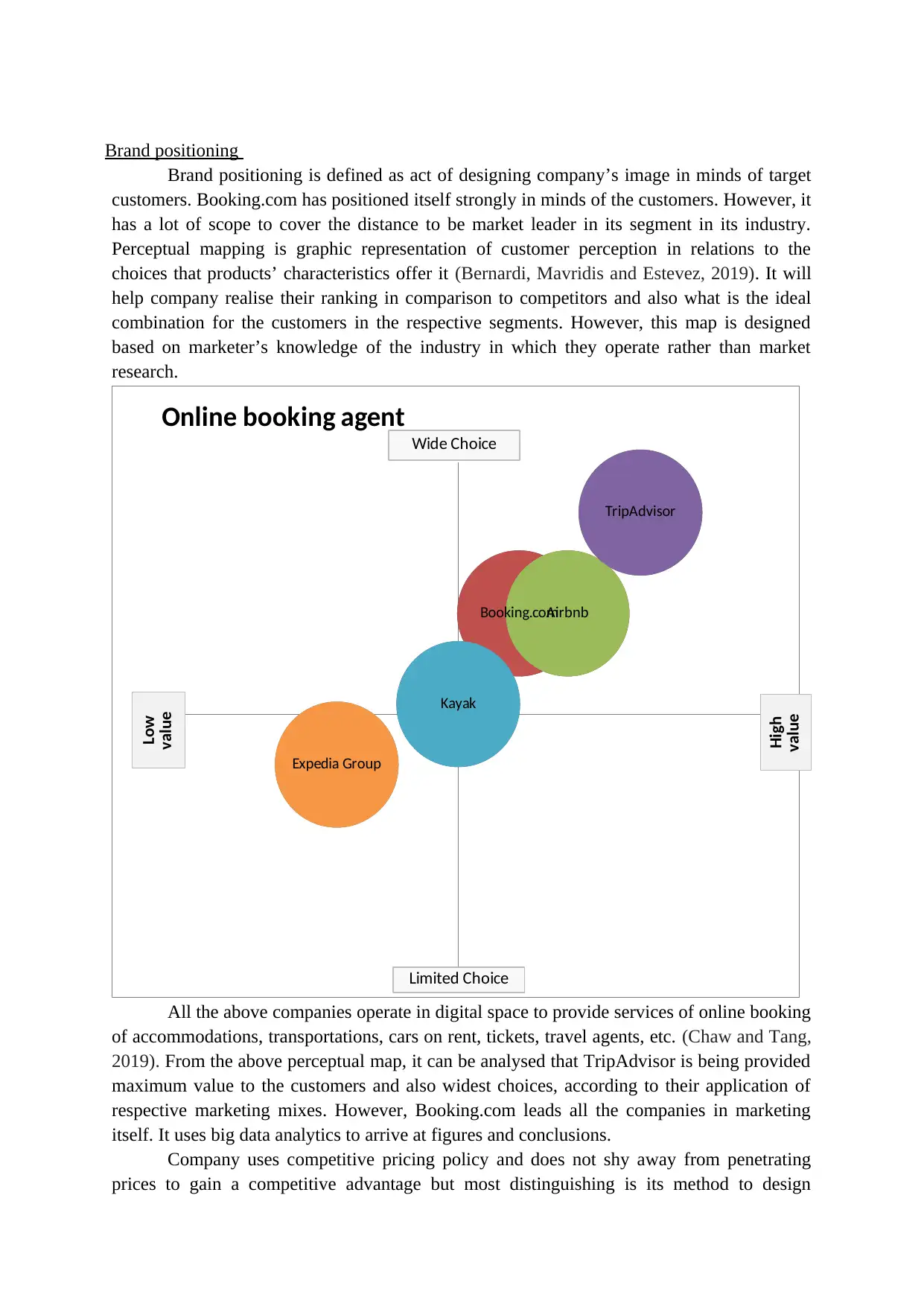
Brand positioning
Brand positioning is defined as act of designing company’s image in minds of target
customers. Booking.com has positioned itself strongly in minds of the customers. However, it
has a lot of scope to cover the distance to be market leader in its segment in its industry.
Perceptual mapping is graphic representation of customer perception in relations to the
choices that products’ characteristics offer it (Bernardi, Mavridis and Estevez, 2019). It will
help company realise their ranking in comparison to competitors and also what is the ideal
combination for the customers in the respective segments. However, this map is designed
based on marketer’s knowledge of the industry in which they operate rather than market
research.
Booking.comAirbnb
TripAdvisor
Kayak
Expedia Group
Online booking agent
High
value
Wide Choice
Low
value
Limited Choice
All the above companies operate in digital space to provide services of online booking
of accommodations, transportations, cars on rent, tickets, travel agents, etc. (Chaw and Tang,
2019). From the above perceptual map, it can be analysed that TripAdvisor is being provided
maximum value to the customers and also widest choices, according to their application of
respective marketing mixes. However, Booking.com leads all the companies in marketing
itself. It uses big data analytics to arrive at figures and conclusions.
Company uses competitive pricing policy and does not shy away from penetrating
prices to gain a competitive advantage but most distinguishing is its method to design
Brand positioning is defined as act of designing company’s image in minds of target
customers. Booking.com has positioned itself strongly in minds of the customers. However, it
has a lot of scope to cover the distance to be market leader in its segment in its industry.
Perceptual mapping is graphic representation of customer perception in relations to the
choices that products’ characteristics offer it (Bernardi, Mavridis and Estevez, 2019). It will
help company realise their ranking in comparison to competitors and also what is the ideal
combination for the customers in the respective segments. However, this map is designed
based on marketer’s knowledge of the industry in which they operate rather than market
research.
Booking.comAirbnb
TripAdvisor
Kayak
Expedia Group
Online booking agent
High
value
Wide Choice
Low
value
Limited Choice
All the above companies operate in digital space to provide services of online booking
of accommodations, transportations, cars on rent, tickets, travel agents, etc. (Chaw and Tang,
2019). From the above perceptual map, it can be analysed that TripAdvisor is being provided
maximum value to the customers and also widest choices, according to their application of
respective marketing mixes. However, Booking.com leads all the companies in marketing
itself. It uses big data analytics to arrive at figures and conclusions.
Company uses competitive pricing policy and does not shy away from penetrating
prices to gain a competitive advantage but most distinguishing is its method to design
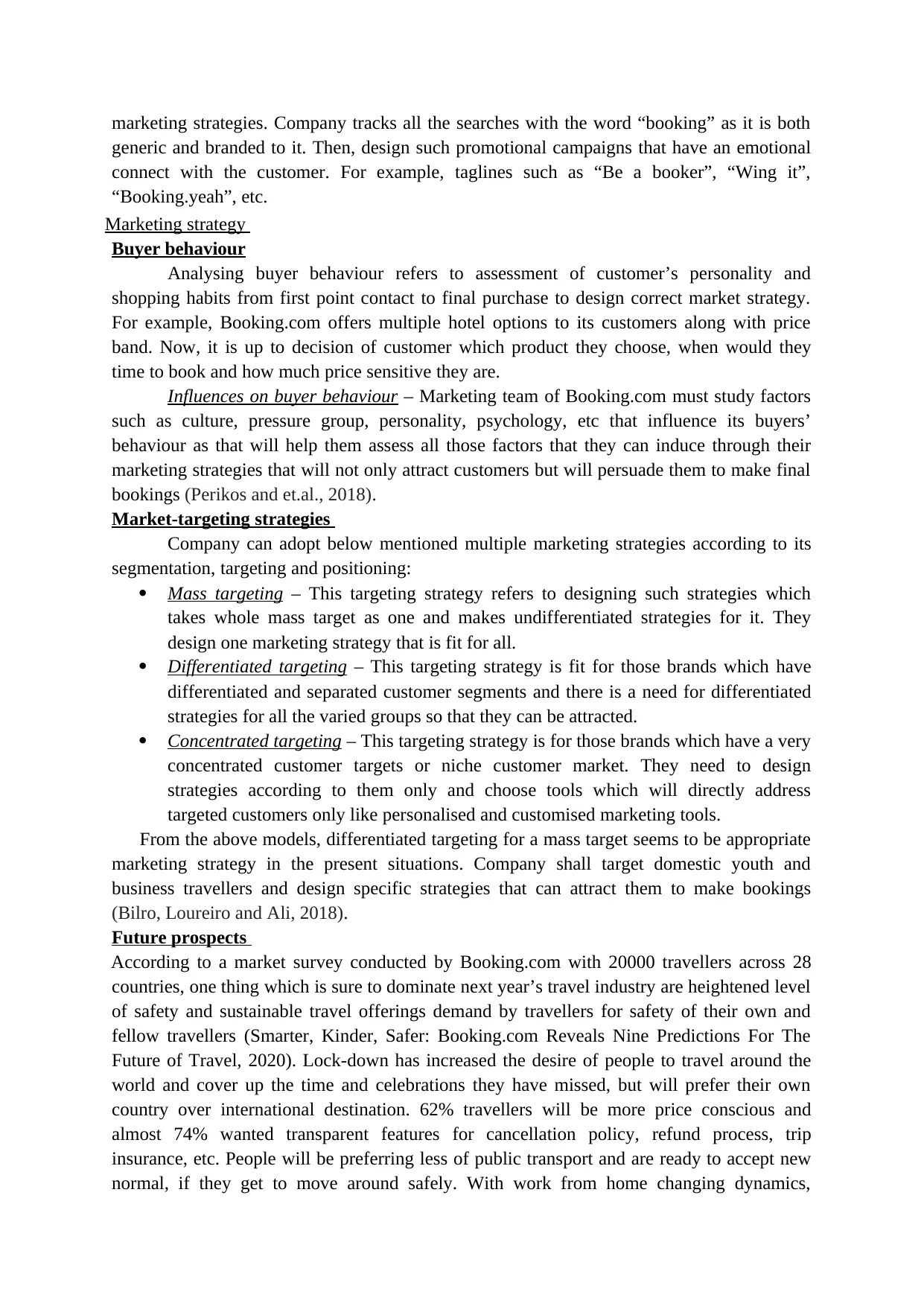
marketing strategies. Company tracks all the searches with the word “booking” as it is both
generic and branded to it. Then, design such promotional campaigns that have an emotional
connect with the customer. For example, taglines such as “Be a booker”, “Wing it”,
“Booking.yeah”, etc.
Marketing strategy
Buyer behaviour
Analysing buyer behaviour refers to assessment of customer’s personality and
shopping habits from first point contact to final purchase to design correct market strategy.
For example, Booking.com offers multiple hotel options to its customers along with price
band. Now, it is up to decision of customer which product they choose, when would they
time to book and how much price sensitive they are.
Influences on buyer behaviour – Marketing team of Booking.com must study factors
such as culture, pressure group, personality, psychology, etc that influence its buyers’
behaviour as that will help them assess all those factors that they can induce through their
marketing strategies that will not only attract customers but will persuade them to make final
bookings (Perikos and et.al., 2018).
Market-targeting strategies
Company can adopt below mentioned multiple marketing strategies according to its
segmentation, targeting and positioning:
Mass targeting – This targeting strategy refers to designing such strategies which
takes whole mass target as one and makes undifferentiated strategies for it. They
design one marketing strategy that is fit for all.
Differentiated targeting – This targeting strategy is fit for those brands which have
differentiated and separated customer segments and there is a need for differentiated
strategies for all the varied groups so that they can be attracted.
Concentrated targeting – This targeting strategy is for those brands which have a very
concentrated customer targets or niche customer market. They need to design
strategies according to them only and choose tools which will directly address
targeted customers only like personalised and customised marketing tools.
From the above models, differentiated targeting for a mass target seems to be appropriate
marketing strategy in the present situations. Company shall target domestic youth and
business travellers and design specific strategies that can attract them to make bookings
(Bilro, Loureiro and Ali, 2018).
Future prospects
According to a market survey conducted by Booking.com with 20000 travellers across 28
countries, one thing which is sure to dominate next year’s travel industry are heightened level
of safety and sustainable travel offerings demand by travellers for safety of their own and
fellow travellers (Smarter, Kinder, Safer: Booking.com Reveals Nine Predictions For The
Future of Travel, 2020). Lock-down has increased the desire of people to travel around the
world and cover up the time and celebrations they have missed, but will prefer their own
country over international destination. 62% travellers will be more price conscious and
almost 74% wanted transparent features for cancellation policy, refund process, trip
insurance, etc. People will be preferring less of public transport and are ready to accept new
normal, if they get to move around safely. With work from home changing dynamics,
generic and branded to it. Then, design such promotional campaigns that have an emotional
connect with the customer. For example, taglines such as “Be a booker”, “Wing it”,
“Booking.yeah”, etc.
Marketing strategy
Buyer behaviour
Analysing buyer behaviour refers to assessment of customer’s personality and
shopping habits from first point contact to final purchase to design correct market strategy.
For example, Booking.com offers multiple hotel options to its customers along with price
band. Now, it is up to decision of customer which product they choose, when would they
time to book and how much price sensitive they are.
Influences on buyer behaviour – Marketing team of Booking.com must study factors
such as culture, pressure group, personality, psychology, etc that influence its buyers’
behaviour as that will help them assess all those factors that they can induce through their
marketing strategies that will not only attract customers but will persuade them to make final
bookings (Perikos and et.al., 2018).
Market-targeting strategies
Company can adopt below mentioned multiple marketing strategies according to its
segmentation, targeting and positioning:
Mass targeting – This targeting strategy refers to designing such strategies which
takes whole mass target as one and makes undifferentiated strategies for it. They
design one marketing strategy that is fit for all.
Differentiated targeting – This targeting strategy is fit for those brands which have
differentiated and separated customer segments and there is a need for differentiated
strategies for all the varied groups so that they can be attracted.
Concentrated targeting – This targeting strategy is for those brands which have a very
concentrated customer targets or niche customer market. They need to design
strategies according to them only and choose tools which will directly address
targeted customers only like personalised and customised marketing tools.
From the above models, differentiated targeting for a mass target seems to be appropriate
marketing strategy in the present situations. Company shall target domestic youth and
business travellers and design specific strategies that can attract them to make bookings
(Bilro, Loureiro and Ali, 2018).
Future prospects
According to a market survey conducted by Booking.com with 20000 travellers across 28
countries, one thing which is sure to dominate next year’s travel industry are heightened level
of safety and sustainable travel offerings demand by travellers for safety of their own and
fellow travellers (Smarter, Kinder, Safer: Booking.com Reveals Nine Predictions For The
Future of Travel, 2020). Lock-down has increased the desire of people to travel around the
world and cover up the time and celebrations they have missed, but will prefer their own
country over international destination. 62% travellers will be more price conscious and
almost 74% wanted transparent features for cancellation policy, refund process, trip
insurance, etc. People will be preferring less of public transport and are ready to accept new
normal, if they get to move around safely. With work from home changing dynamics,
⊘ This is a preview!⊘
Do you want full access?
Subscribe today to unlock all pages.

Trusted by 1+ million students worldwide
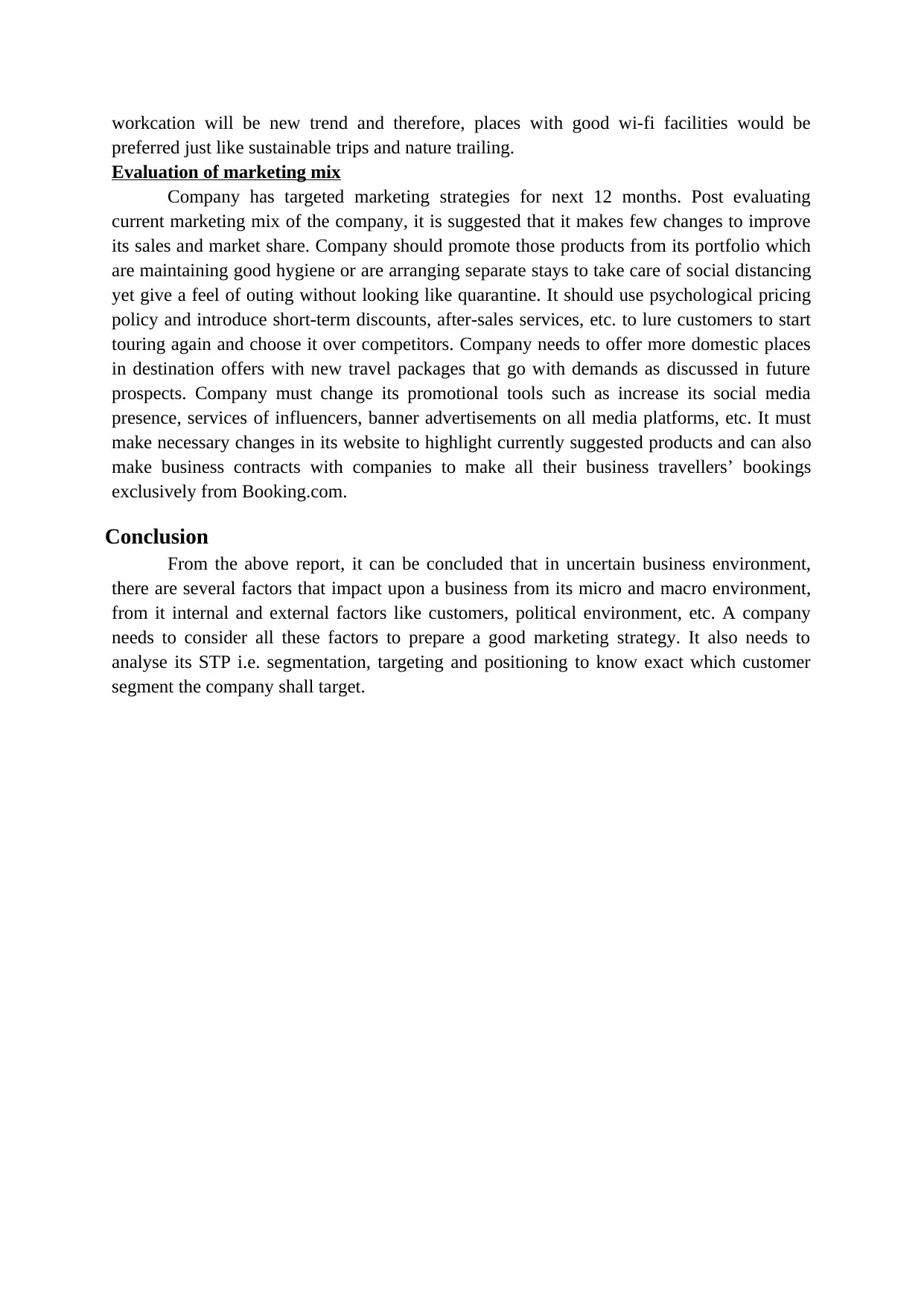
workcation will be new trend and therefore, places with good wi-fi facilities would be
preferred just like sustainable trips and nature trailing.
Evaluation of marketing mix
Company has targeted marketing strategies for next 12 months. Post evaluating
current marketing mix of the company, it is suggested that it makes few changes to improve
its sales and market share. Company should promote those products from its portfolio which
are maintaining good hygiene or are arranging separate stays to take care of social distancing
yet give a feel of outing without looking like quarantine. It should use psychological pricing
policy and introduce short-term discounts, after-sales services, etc. to lure customers to start
touring again and choose it over competitors. Company needs to offer more domestic places
in destination offers with new travel packages that go with demands as discussed in future
prospects. Company must change its promotional tools such as increase its social media
presence, services of influencers, banner advertisements on all media platforms, etc. It must
make necessary changes in its website to highlight currently suggested products and can also
make business contracts with companies to make all their business travellers’ bookings
exclusively from Booking.com.
Conclusion
From the above report, it can be concluded that in uncertain business environment,
there are several factors that impact upon a business from its micro and macro environment,
from it internal and external factors like customers, political environment, etc. A company
needs to consider all these factors to prepare a good marketing strategy. It also needs to
analyse its STP i.e. segmentation, targeting and positioning to know exact which customer
segment the company shall target.
preferred just like sustainable trips and nature trailing.
Evaluation of marketing mix
Company has targeted marketing strategies for next 12 months. Post evaluating
current marketing mix of the company, it is suggested that it makes few changes to improve
its sales and market share. Company should promote those products from its portfolio which
are maintaining good hygiene or are arranging separate stays to take care of social distancing
yet give a feel of outing without looking like quarantine. It should use psychological pricing
policy and introduce short-term discounts, after-sales services, etc. to lure customers to start
touring again and choose it over competitors. Company needs to offer more domestic places
in destination offers with new travel packages that go with demands as discussed in future
prospects. Company must change its promotional tools such as increase its social media
presence, services of influencers, banner advertisements on all media platforms, etc. It must
make necessary changes in its website to highlight currently suggested products and can also
make business contracts with companies to make all their business travellers’ bookings
exclusively from Booking.com.
Conclusion
From the above report, it can be concluded that in uncertain business environment,
there are several factors that impact upon a business from its micro and macro environment,
from it internal and external factors like customers, political environment, etc. A company
needs to consider all these factors to prepare a good marketing strategy. It also needs to
analyse its STP i.e. segmentation, targeting and positioning to know exact which customer
segment the company shall target.
Paraphrase This Document
Need a fresh take? Get an instant paraphrase of this document with our AI Paraphraser
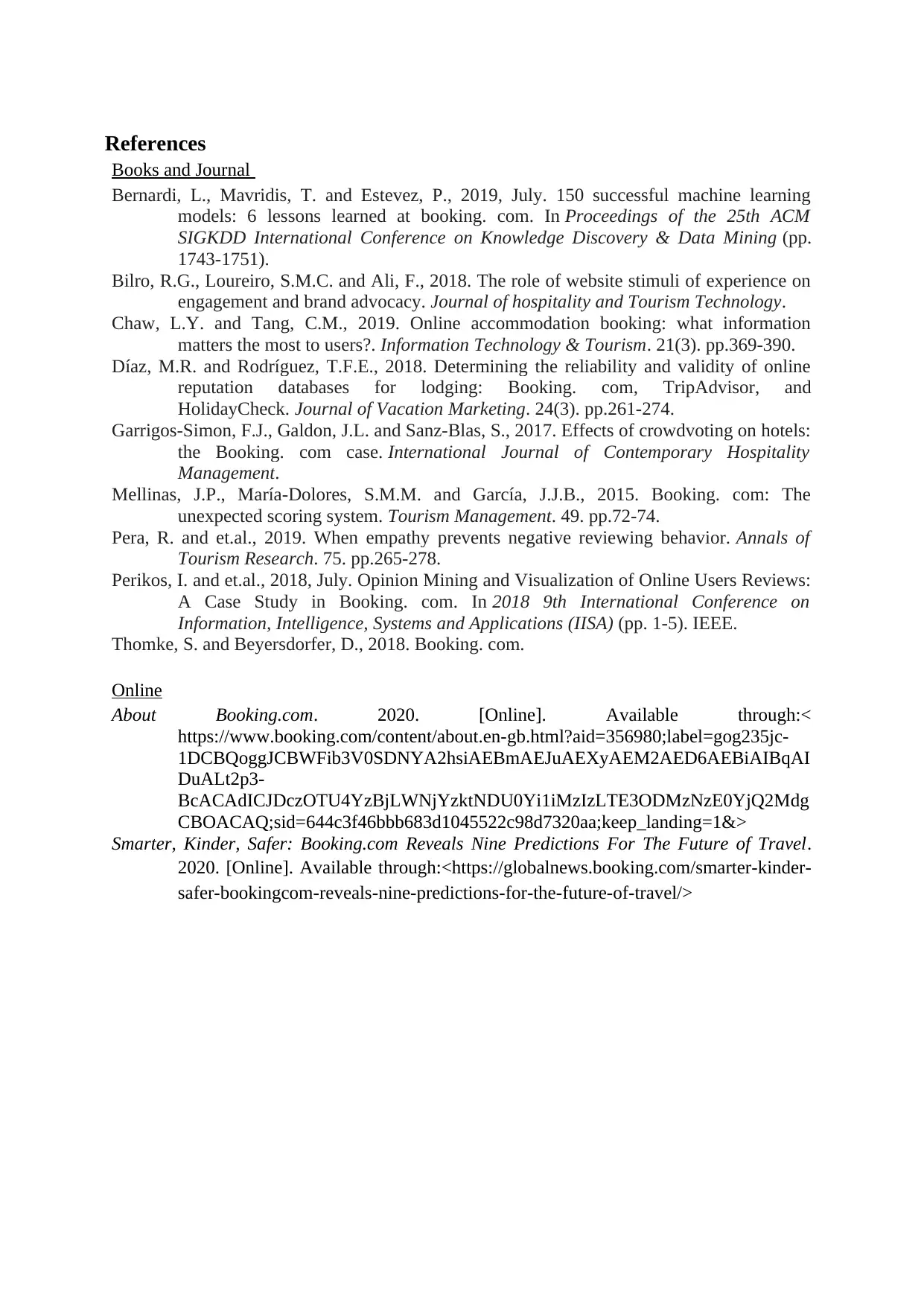
References
Books and Journal
Bernardi, L., Mavridis, T. and Estevez, P., 2019, July. 150 successful machine learning
models: 6 lessons learned at booking. com. In Proceedings of the 25th ACM
SIGKDD International Conference on Knowledge Discovery & Data Mining (pp.
1743-1751).
Bilro, R.G., Loureiro, S.M.C. and Ali, F., 2018. The role of website stimuli of experience on
engagement and brand advocacy. Journal of hospitality and Tourism Technology.
Chaw, L.Y. and Tang, C.M., 2019. Online accommodation booking: what information
matters the most to users?. Information Technology & Tourism. 21(3). pp.369-390.
Díaz, M.R. and Rodríguez, T.F.E., 2018. Determining the reliability and validity of online
reputation databases for lodging: Booking. com, TripAdvisor, and
HolidayCheck. Journal of Vacation Marketing. 24(3). pp.261-274.
Garrigos-Simon, F.J., Galdon, J.L. and Sanz-Blas, S., 2017. Effects of crowdvoting on hotels:
the Booking. com case. International Journal of Contemporary Hospitality
Management.
Mellinas, J.P., María-Dolores, S.M.M. and García, J.J.B., 2015. Booking. com: The
unexpected scoring system. Tourism Management. 49. pp.72-74.
Pera, R. and et.al., 2019. When empathy prevents negative reviewing behavior. Annals of
Tourism Research. 75. pp.265-278.
Perikos, I. and et.al., 2018, July. Opinion Mining and Visualization of Online Users Reviews:
A Case Study in Booking. com. In 2018 9th International Conference on
Information, Intelligence, Systems and Applications (IISA) (pp. 1-5). IEEE.
Thomke, S. and Beyersdorfer, D., 2018. Booking. com.
Online
About Booking.com. 2020. [Online]. Available through:<
https://www.booking.com/content/about.en-gb.html?aid=356980;label=gog235jc-
1DCBQoggJCBWFib3V0SDNYA2hsiAEBmAEJuAEXyAEM2AED6AEBiAIBqAI
DuALt2p3-
BcACAdICJDczOTU4YzBjLWNjYzktNDU0Yi1iMzIzLTE3ODMzNzE0YjQ2Mdg
CBOACAQ;sid=644c3f46bbb683d1045522c98d7320aa;keep_landing=1&>
Smarter, Kinder, Safer: Booking.com Reveals Nine Predictions For The Future of Travel.
2020. [Online]. Available through:<https://globalnews.booking.com/smarter-kinder-
safer-bookingcom-reveals-nine-predictions-for-the-future-of-travel/>
Books and Journal
Bernardi, L., Mavridis, T. and Estevez, P., 2019, July. 150 successful machine learning
models: 6 lessons learned at booking. com. In Proceedings of the 25th ACM
SIGKDD International Conference on Knowledge Discovery & Data Mining (pp.
1743-1751).
Bilro, R.G., Loureiro, S.M.C. and Ali, F., 2018. The role of website stimuli of experience on
engagement and brand advocacy. Journal of hospitality and Tourism Technology.
Chaw, L.Y. and Tang, C.M., 2019. Online accommodation booking: what information
matters the most to users?. Information Technology & Tourism. 21(3). pp.369-390.
Díaz, M.R. and Rodríguez, T.F.E., 2018. Determining the reliability and validity of online
reputation databases for lodging: Booking. com, TripAdvisor, and
HolidayCheck. Journal of Vacation Marketing. 24(3). pp.261-274.
Garrigos-Simon, F.J., Galdon, J.L. and Sanz-Blas, S., 2017. Effects of crowdvoting on hotels:
the Booking. com case. International Journal of Contemporary Hospitality
Management.
Mellinas, J.P., María-Dolores, S.M.M. and García, J.J.B., 2015. Booking. com: The
unexpected scoring system. Tourism Management. 49. pp.72-74.
Pera, R. and et.al., 2019. When empathy prevents negative reviewing behavior. Annals of
Tourism Research. 75. pp.265-278.
Perikos, I. and et.al., 2018, July. Opinion Mining and Visualization of Online Users Reviews:
A Case Study in Booking. com. In 2018 9th International Conference on
Information, Intelligence, Systems and Applications (IISA) (pp. 1-5). IEEE.
Thomke, S. and Beyersdorfer, D., 2018. Booking. com.
Online
About Booking.com. 2020. [Online]. Available through:<
https://www.booking.com/content/about.en-gb.html?aid=356980;label=gog235jc-
1DCBQoggJCBWFib3V0SDNYA2hsiAEBmAEJuAEXyAEM2AED6AEBiAIBqAI
DuALt2p3-
BcACAdICJDczOTU4YzBjLWNjYzktNDU0Yi1iMzIzLTE3ODMzNzE0YjQ2Mdg
CBOACAQ;sid=644c3f46bbb683d1045522c98d7320aa;keep_landing=1&>
Smarter, Kinder, Safer: Booking.com Reveals Nine Predictions For The Future of Travel.
2020. [Online]. Available through:<https://globalnews.booking.com/smarter-kinder-
safer-bookingcom-reveals-nine-predictions-for-the-future-of-travel/>
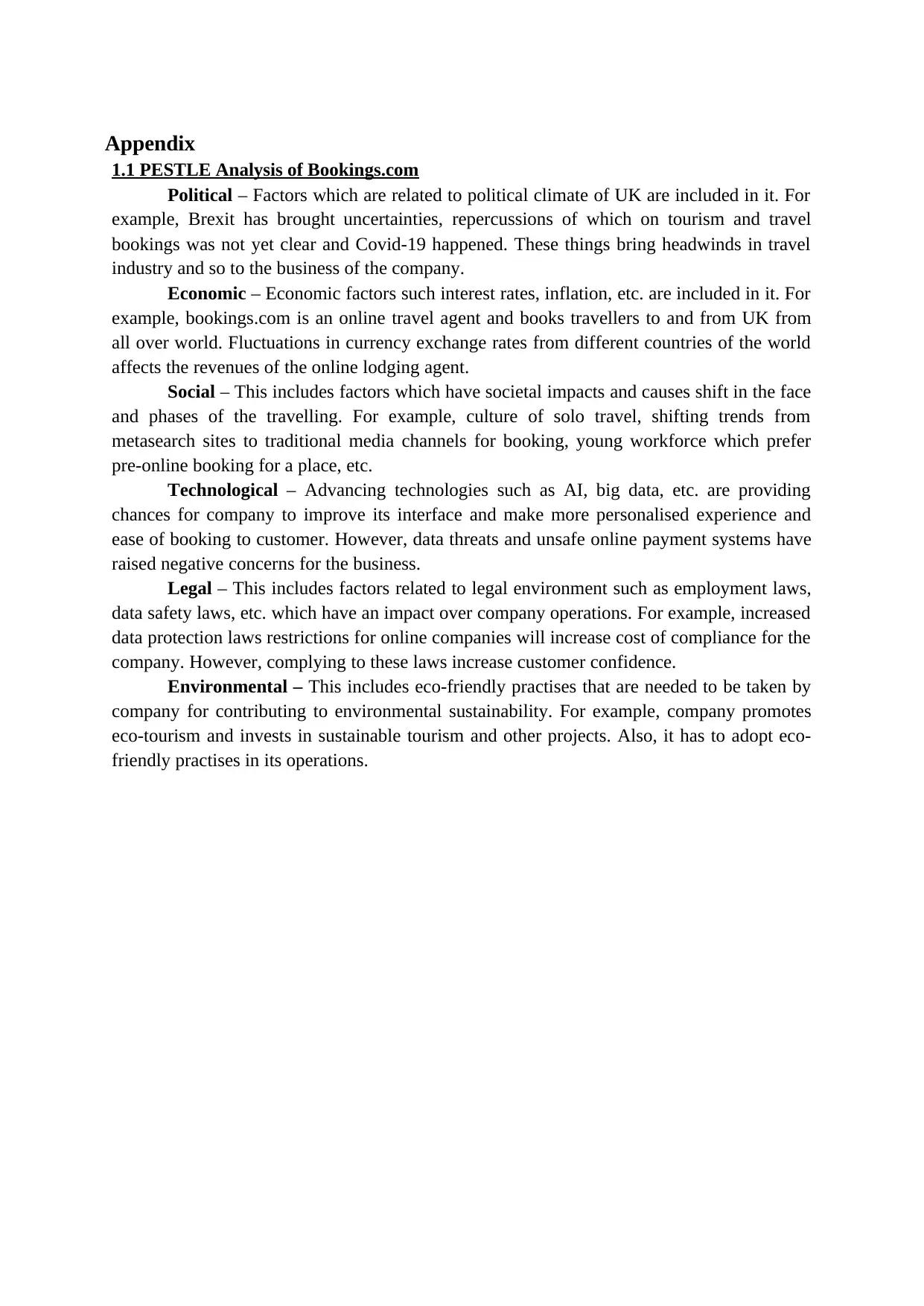
Appendix
1.1 PESTLE Analysis of Bookings.com
Political – Factors which are related to political climate of UK are included in it. For
example, Brexit has brought uncertainties, repercussions of which on tourism and travel
bookings was not yet clear and Covid-19 happened. These things bring headwinds in travel
industry and so to the business of the company.
Economic – Economic factors such interest rates, inflation, etc. are included in it. For
example, bookings.com is an online travel agent and books travellers to and from UK from
all over world. Fluctuations in currency exchange rates from different countries of the world
affects the revenues of the online lodging agent.
Social – This includes factors which have societal impacts and causes shift in the face
and phases of the travelling. For example, culture of solo travel, shifting trends from
metasearch sites to traditional media channels for booking, young workforce which prefer
pre-online booking for a place, etc.
Technological – Advancing technologies such as AI, big data, etc. are providing
chances for company to improve its interface and make more personalised experience and
ease of booking to customer. However, data threats and unsafe online payment systems have
raised negative concerns for the business.
Legal – This includes factors related to legal environment such as employment laws,
data safety laws, etc. which have an impact over company operations. For example, increased
data protection laws restrictions for online companies will increase cost of compliance for the
company. However, complying to these laws increase customer confidence.
Environmental – This includes eco-friendly practises that are needed to be taken by
company for contributing to environmental sustainability. For example, company promotes
eco-tourism and invests in sustainable tourism and other projects. Also, it has to adopt eco-
friendly practises in its operations.
1.1 PESTLE Analysis of Bookings.com
Political – Factors which are related to political climate of UK are included in it. For
example, Brexit has brought uncertainties, repercussions of which on tourism and travel
bookings was not yet clear and Covid-19 happened. These things bring headwinds in travel
industry and so to the business of the company.
Economic – Economic factors such interest rates, inflation, etc. are included in it. For
example, bookings.com is an online travel agent and books travellers to and from UK from
all over world. Fluctuations in currency exchange rates from different countries of the world
affects the revenues of the online lodging agent.
Social – This includes factors which have societal impacts and causes shift in the face
and phases of the travelling. For example, culture of solo travel, shifting trends from
metasearch sites to traditional media channels for booking, young workforce which prefer
pre-online booking for a place, etc.
Technological – Advancing technologies such as AI, big data, etc. are providing
chances for company to improve its interface and make more personalised experience and
ease of booking to customer. However, data threats and unsafe online payment systems have
raised negative concerns for the business.
Legal – This includes factors related to legal environment such as employment laws,
data safety laws, etc. which have an impact over company operations. For example, increased
data protection laws restrictions for online companies will increase cost of compliance for the
company. However, complying to these laws increase customer confidence.
Environmental – This includes eco-friendly practises that are needed to be taken by
company for contributing to environmental sustainability. For example, company promotes
eco-tourism and invests in sustainable tourism and other projects. Also, it has to adopt eco-
friendly practises in its operations.
⊘ This is a preview!⊘
Do you want full access?
Subscribe today to unlock all pages.

Trusted by 1+ million students worldwide
1 out of 9
Related Documents
Your All-in-One AI-Powered Toolkit for Academic Success.
+13062052269
info@desklib.com
Available 24*7 on WhatsApp / Email
![[object Object]](/_next/static/media/star-bottom.7253800d.svg)
Unlock your academic potential
Copyright © 2020–2026 A2Z Services. All Rights Reserved. Developed and managed by ZUCOL.





